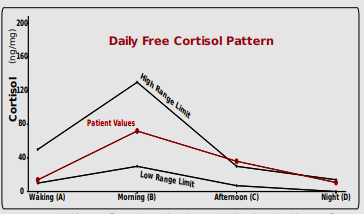Top 3 Reasons Why Glucose Regulation and Adrenal Health are Key to Your Well-Being
When it comes to maintaining overall health, two critical components often overlooked are blood glucose regulation and adrenal health. These foundational aspects are vital for your body's ability to function optimally, manage stress, and maintain energy levels. Understanding and supporting these systems can lead to significant improvements in your health and well-being.
If you completed my hormone quiz, you would have had a number of checkmarks in the top 2 boxes of the quiz. If you’d like to, click here.
1. Blood Glucose Regulation: Your Energy Lifeline
Blood glucose, or blood sugar, is the main source of energy for your body’s cells. It comes from the food you eat and is transported through your bloodstream to your cells. Proper regulation of blood glucose levels is crucial because both high and low levels can lead to serious health issues.
Why is Blood Glucose Regulation Important?
Energy Management: Consistent blood glucose levels ensure a steady supply of energy to your cells, which is essential for daily activities and overall vitality.
Preventing Chronic Diseases: Poor blood glucose control can lead to conditions like diabetes, cardiovascular disease, and obesity.
Cognitive Function: Your brain relies on glucose as its primary energy source. Stable glucose levels support cognitive functions such as memory, concentration, and mood.
Pay particular attention if you are in perimenopause (aka the ages between 35 and 52) and/or if you are experiencing anxiety.
Quiz Snapshot
These are common symptoms of Insulin / Blood Sugar Balance
Research supports the importance of maintaining balanced blood glucose levels. A study published in the Journal of Clinical Endocrinology & Metabolism found that individuals with better blood glucose control had a lower risk of developing cardiovascular diseases and diabetes-related complications.
2. Adrenal Health: Your Stress Management Center
Your adrenal glands, located on top of your kidneys, play a key role in managing your body's stress response. They produce hormones such as cortisol and adrenaline, which help you respond to stress and maintain energy levels.
This is an image from a Dutch Hormone Functional Lab which helps us learn about the condition of the adrenals and other hormones.
Women entering perimenopause with weak adrenals often have a ‘bumpy ride’.
Why is Adrenal Health Important?
Stress Response: Healthy adrenal glands ensure an appropriate response to stress, helping your body to cope with physical, emotional, and mental stressors.
Energy Production: The adrenal glands produce hormones that regulate your metabolism and energy levels throughout the day.
Immune Function: Cortisol, one of the primary hormones produced by the adrenal glands, has anti-inflammatory properties that support immune function.
Chronic stress can lead to adrenal fatigue, a condition where your adrenal glands are unable to produce adequate levels of hormones, resulting in symptoms like fatigue, body aches, and sleep disturbances. Adrenals are also responsible for balancing blood glucose levels. See the connection!?
When we know this, we can create a targeted plan to build the body back up.
Quiz Snapshot
These are typical symptoms of adrenal fatigue.
3. The Dynamic Duo: Blood Glucose and Adrenal Health
Blood glucose regulation and adrenal health are closely connected. When you experience stress, your body releases cortisol, which can increase blood glucose levels. Chronic stress and poor diet can lead to a cycle of high blood sugar and elevated cortisol levels, which can strain your adrenal glands and lead to further health issues.
Maintaining a balanced diet, regular physical activity, and stress management techniques such as mindfulness and relaxation exercises can help support both blood glucose regulation and adrenal health.
Practical Tips for Supporting Blood Glucose and Adrenal Health
Eat Balanced Meals: Focus on a diet rich in whole foods, including plenty of vegetables, lean proteins, and healthy fats. Avoid excessive sugar and refined carbohydrates. Easy, right!? ;) If you’ve ever struggled in this area or have a history of jumping from diet to diet, consider doing my 12 week program to learn some key concepts like self sabotage and my core tips to avoid diet mentality.
Regular Exercise: Engage in regular physical activity, which helps to regulate blood sugar levels and reduce stress. Again, we all know this, if you’re not doing it, consider my 12 week program!
Stress Management: Incorporate stress-reducing practices such as meditation, yoga, deep breathing exercises, or hobbies you enjoy.
Adequate Sleep: Ensure you get 7-9 hours of quality sleep each night to support adrenal health and overall well-being.
By prioritizing blood glucose regulation and adrenal health, you can build a strong foundation for your overall health. These two aspects are interconnected and play a crucial role in maintaining your energy, managing stress, and preventing chronic diseases. Taking steps to support these systems can lead to a healthier, more balanced life.
References:
"The Importance of Maintaining Blood Glucose Levels" - Journal of Clinical Endocrinology & Metabolism.
Ready to take control of your health? Join my 12-week program, "Fix Your Hormones and Fight Fatigue," to learn how to balance your blood glucose levels, support your adrenal health, and achieve lasting energy and vitality.
Learn about my Fight Fatigue 12 Week Program
Or, grab my Blood Glucose Balance 7 Day Plan - that will provide a menu plan, grocery list and everything you need to get your blood glucose levels balanced in 7 days!







